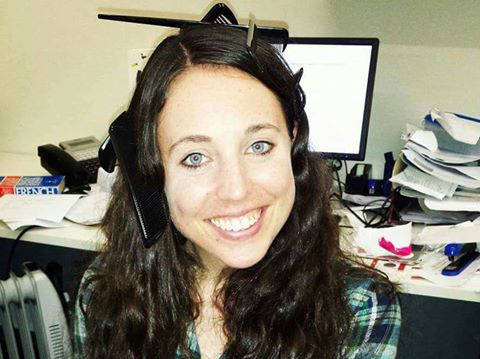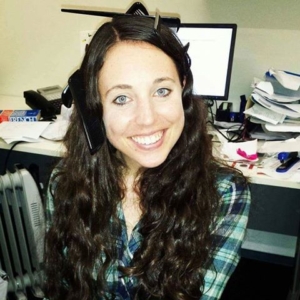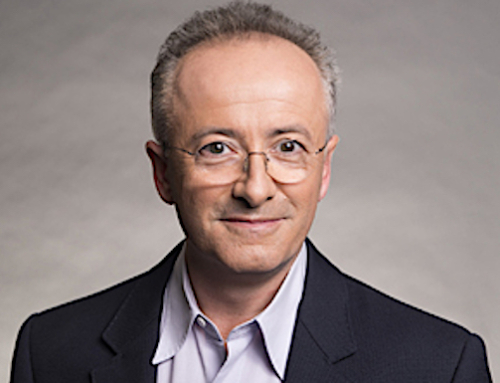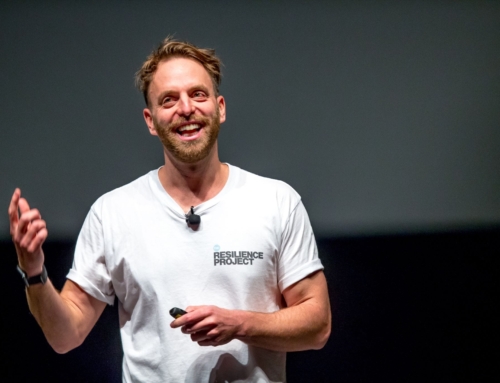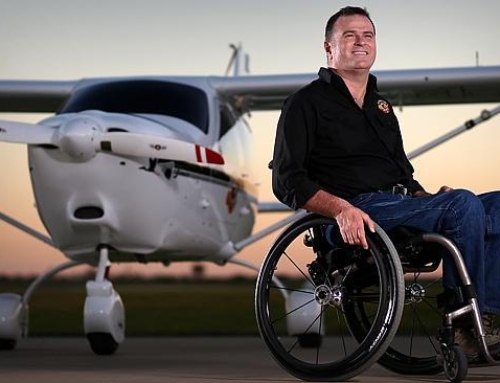By the time you read this, Amelia McDermott will no longer be working as a community case worker on the refugee health team at ISIS Primary Care. The reason? Funding cuts to the Victorian Health Department. At the time of this interview, Amelia was working in her third job in the nearly five years of being employed by the sector; each position change has been directly due to changes in government funding:
“I’m a social worker with asylum seekers and refugees. I’ve been in this particular job for a year, but I’ve been doing essentially the same job for the last four and a half years.”
It’s hard to find long-term employment working with asylum seekers and refugees, but Amelia was drawn to the field through the experiences of her grandfather:
“He was a Holocaust survivor, and so came to Australia as a refugee. Without even realising it, that’s always been a real part of my life. I was very interested in it growing up. That’s actually why I’m here, people helped him and he was able to settle down and have a family. He wouldn’t have been able to do that if people hadn’t helped him.I thought I would like to do that too.”
As a twin, Amelia traces her passion for human rights back to her childhood:
“I have a very strong sense of equality; ‘If she gets something, I have to get it’, that’s how I grew up, everything had to be fair and equal. From a very young age, everything always had to be equal for everybody, and then as I got older, I applied that process to human rights. I find it really sad that people in the world are not equal, that I get something and someone else doesn’t get it just by luck, that’s really not fair.”
At a loose end after university, the Media and Communications/Arts graduate went to Kenya volunteering as a teacher, completing a Masters of Social Work on her return, “maybe because I didn’t really want to be a journalist, because journalists, as they presented it to us, if a tragedy happens to someone, you go to their house and you stick a microphone in their face, and you say , ‘tell me what you’re feeling.’ I didn’t have any interest in doing that.”
A natural people person, it is perhaps no surprise that Amelia started working with people on a one-on-one basis:
“The only thing I thought would be interesting would be talking to people. I used to love it when people stopped me and asked me for directions, ‘Oh I can help you’. I got a real kick out of that. Even when I didn’t know where they were asking me, I’d be like, ‘I’ll figure it out!’ I thought maybe that could be a job, you just help people, and not because I think I’m so good and I can help everybody, but because it’s fun and I get a kick out of doing stuff with people. It’s not ‘help them, like do something for them’, it’s ‘do it with them’.”
Six and a half years ago, Amelia started volunteering with asylum seekers. According to the 1951 Convention and Protocol relating to the Status of Refugees developed by the United Nations, a refugee is someone with a ‘well-founded fear of persecution for reasons of race, religion, nationality, membership of a particular social group, or a political opinion…’..
“Everybody just wants to be safe and to bring their family over. They’re just the same as us really! I used to work with teenage boys who were here by themselves, so they would all come over on boats by themselves…underage… had to live in residential settings. They were great, but they had stupid teenage boy problems!”
Working with refugees and asylum seekers differs from being a social worker with other sectors of the community because with those of a difficult upbringing:
“…it might be hard to form a relationship with them because there’s a lot of barriers, but working with asylum seekers and refugees, they are so happy to talk to you and you really become part of their lives, which is great. We obviously have professional boundaries but we do become a really important part of their lives, I’ve had a lot of people say ‘You’re like a sister to me, you’re like a daughter to me.’, which is really lovely.”
At ISIS Primary Care, Amelia’s tasks varied every day:
“People come in, or I go and visit them at their houses. Most of my clients are long-term ones, so I get to know them really well. I’d go there by myself usually because the others on the team are nurses, refugee health nurses. Sometimes I do some nursing. One of the clients works at a meat factory and the meat factory just said to them, ‘We’re changing from 7.6 hour shifts to 9.5 hour shifts which means heaps of you are losing your jobs from Monday’. He said, ‘I don’t know what I’m going to do because if I don’t have a job, I can’t afford to live, I’ll be destitute’. He’s an asylum seeker from Iran, he doesn’t really speak very good English, he’s not aware of what his rights are in the workplace. I don’t think this is fair, and so I was helping him go through maybe this is an unfair thing, then we were talking about how to get another job. I do a lot of counselling.”
Rather than providing support from behind a desk or over a phone, Amelia loves to be at the coalface, interacting personally with those trying to make a life for themselves in Australia:
“What I like most are home visits – you get to hang out at people’s houses, they feel a lot more comfortable talking. Often they feed me with lots of delicious food! We used to do this wilderness program where one day a week, we’d take people out to do lots of outdoor activities and these were all asylum seekers who didn’t have any money. We went snorkelling, went for a walk to Cape Shank or Hanging Rock. For a lot of them this is their first chance to appreciate the Australian country, rather than just be in a detention centre or live in community detention…. a bunch of people from Afghanistan who’ve never seen a gum tree before – they get to be outside and feel a connection to the land.”
A keen traveller, Amelia’s favourite places might surprise you:
“I went to Iran based on the experiences I’ve had with people here. It’s a very safe country for travellers, not a great place to live. There were people who said, ‘How do I get out of here? Take me with you’, which is really sad, There are so many countries I’d love to go to, because I’ve met so many people from there, and they all have family living there and they say ‘If you’re ever in my country let me know because you’ll have a place to stay. Sri Lanka, Burma, Pakistan. However, I would strongly recommend Iran to everyone, the people are so friendly and talkative and the food is delicious, it’s geographically beautiful, there are thousands of years of history which they’re really proud of.”
When asked to paint a portrait of her client base, Amelia’s face lit up as she told me about an Hazara teenage boy:
“I always remember he’d never made a cake before, and one time we decided to have a bake-off. He and I were on the same team and we made a cake together, mainly he did it but I was directing him. After we did it he had to decorate it and he was like ‘Oh, do we have to put it back in the oven now?’. He didn’t know how to do it and he took all these photos, he was so happy. When he finished school, he wanted to have an IT business, he’d been in Australia for, like, three years, still going through the process. As soon as he turned eighteen, he wasn’t allowed to attend school any more, because that was Immigration’s law. He had to go out on his own on a bridging VISA, which means you get some money from the Government, but you have to support yourself. So he’s eighteen, he’s in a new country, he’s expected to find a place to rent with no money and he’s like ‘I can do everything’. I called him to check on him after a few weeks, (I wasn’t meant to be working with him any more because he’d left our program), and he’s like,’Yeah everything’s going well… I mean, I don’t have a mattress or a fridge, I’ve been sleeping on the floor, in an empty room’. He wasn’t complaining, but that was the sort of thing he had to put up with. We got him furniture and all that, which was great, but he’s still going through the process because Immigration has deliberately not been processing people who’ve arrived by boat. The cut-off was if you arrived before August 13, 2012, you could be processed. If you arrived after, you wouldn’t, and he arrived on August 23rd or something 2012.I often think about how he’s going. I haven’t seen him for ages, but he’s the kind of person you want in this country. He’s such a hard worker, such a decent guy.”
The upcoming election serves as an uncomfortable reminder that the treatment of asylum seekers is still a major political issue:
“…mainly politicians have created this whole politicised rhetoric that we’re being invaded, which is not true. The numbers of people coming are so small compared to the numbers of people coming through other channels. The coalition has stopped the boats, so there aren’t as many people coming now, but that’s because they’re all stuck in Indonesia and Malaysia, languishing away there.”
When a social issue becomes part of a political platform and the media latch on to it, often facts get twisted, exaggerated and victims of sensationalised propaganda:
“Peter Dutton, Immigration Minister said [asylum seekers] are all illiterate and innumerate, wanting to go on Centrelink forever. It’s the opposite; ever single asylum seeker I know comes in with the absolute intention to work, to contribute to society. None of them want to be on Centrelink at all. A lot of them are not religious at all, they aren’t Christians, they aren’t Muslims, it has no relevance to their life. They’re not coming here changing our way of life.”
People against the welcoming of asylum seekers and refugees often don’t understand the extent of the violence from which they are escaping:
“I used to work with this guy from Afghanistan, sixteen years old when he came to Australia, about five brothers and sisters back home, his dad had been killed by the Taliban, and he was the oldest son so his mum sent him over for his own safety. Terrible things happened to him back in Afghanistan, he had scars on his body from bombs going off by the Taliban…”
This story is all too typical for refugees, with the father or eldest son sent to make a life for themselves, with the rest of the family to follow when it is safe to do so:
“Another client that I used to work with, his brother came to Australia quite a few years ago by boat and he and his father were still in Malaysia. My client was sixteen years old and he really missed his brother, so he got on a boat. [H]e didn’t tell his father and his dad freaked out and got on the next boat to come as well, and drowned on the way. It was terrible, my client feels really guilty about that but he also says, ‘I would have still done it because I couldn’t stand to stay there any longer in that situation’. I know quite a few people who’ve been involved in drownings and they all say ‘I would still get on the boat’. I say to anybody who says they should go back where they came from, ‘If you’re willing to get on a boat that people drown on and you still want to do it, obviously whatever you’re coming from is so much worse’.”
The type of violence experienced depends on the country, Amelia explains:
“If they’re coming from Afghanistan, they’re almost all Hazara people who are a very persecuted minority by the Taliban. If they’re coming from Burma, they’re usually Rohingya people, another persecuted minority. If they’re coming from Iran, it’s usually political issues. Iran is a very oppressive Government, you don’t have freedom to speak out against the Government or anything, if people run into trouble with that, or if they’ve converted to Christianity, they come here.”
Boarding a boat though, Amelia says, is just one part of a very complicated process:
“For example, if you were starting from Iran, usually what you’d do is get a fake VISA, pay a smuggler to fly to Dubai, then fly to Indonesia then wait until the people smuggler says ‘Alright, tomorrow 5am, go to the docks’. Most people I know have stayed in Indonesia about a month. That’s from Iran which is slightly easier. People from Afghanistan tell stories about how they had to walk across borders, walk through dangerous areas from country to country, getting harassed and chased by police and all of that.”
Detention centres are often hidden, out of sight of the general public,however through her role with ISIS Primary Care, Amelia was permitted to peek behind the veil to witness the life asylum seekers endure:
“I’ve been to plenty of detention centres, some are worse than others. In one in Melbourne, they have an outdoor area, a courtyard and they’re just sitting there. They sleep all day and get up in the nighttime, just wander around. They have this reward system, like ‘If you go to English class, you’ll get this amount of points and you can spend the points in the lolly shop in the detention centre’, and these are grown men. There’s women too, but mainly it’s men in the one in Maribyrnong. It’s just really demeaning. They do have classes on, and they have a gym, which you can use, I think only an hour a day. Otherwise, they just sit around all day doing nothing. There’s one in Broadmeadows called MITA (Melbourne Immigration Transit Accommodation) which is more family-centred, so they have a lot of classes -they have school for kids, they do run activities.”
Amelia tells of the trauma caused by these centres:
“I always remember having this client who had been in MITA for ages, he was a teenage boy and he had left something there. We had to go back there to get it, and as soon as we drove up there, he started getting really agitated and nervous. He told me that his heart was beating really fast. Even though they had been really good to him, he was trapped in there…crossing that driveway to go back in there made him feel caged again.”
The length of stay is often indefinite:
“It’s quite complicated because it depends on when they arrived…it’s mainly in Naru and Manus Island that people are in detention centres now and they’re not getting released unless they have serious medical problems and get flown to Australia. It used to be that Most people came from Indonesia or Malaysia, they go to Christmas Island for a little while, they transfer to one of the mainland detention centres and they stay there for 3 months or 3 years or something. Usually, if you were under eighteen, you’d get released after a few months, but it wasn’t connected to the actual VISA process. You still had to go through and get a VISA, but people would get released arbitrarily, it had nothing to do with anything, suddenly the Government would decide.”
The psychological effects of living in detention severely impact on their chances of tasting freedom:
“I have one client who’s been here for five years and he still hasn’t been processed – he’s very traumatised and trauma has a very strong effect on memory. Now he can’t even remember all the things that happened to him so when he gets processed, they’ll say ‘Give us exact dates, times, places where this happened…’ and if they decide that his story doesn’t check out, they’ll excuse him of lying and he won’t get a VISA, but actually his memory’s gone, he’s been in psychiatric wards. They don’t check, I’ve been to official interviews, the only person who’s allowed to talk is the person themselves. I’ve been to ones where it’s like a courtroom, with a judge, an interpreter and a lawyer. A person will get up and say I wanted to come here because of what happened in my home country, they’ll say, ‘Did that really happen?’, and they won’t want to talk about it because they are talking in front of strangers and it’s re-traumatising. The judge will then say ‘You’re lying, because you can’t even talk about it properly’.”
Amelia admits spending her days with people who aren’t granted the most basic human rights made it difficult for her to relate to others’ problems , seemingly trivial in comparison:
“It was my first job after I finished uni. I used to work all the time and be thinking about my clients after work hours. To other people’s problems, so-called ‘first world problems’, (although I do hate that phrase), I’d be like ‘God, that’s nothing, how can you even care about that?’ I remember losing it at my parents once because they got all these new floorboards in their house for the sake of the look, not for any practical reason, and they were telling me I had to admire their floorboards and asking why I hadn’t commented on their floorboards, and I lost my temper. I learnt that if you give too much of yourself and if you start not realising that your needs are important and everything’s relative, you’ll just be unhappy, so I don’t do that anymore… but there have been times when I have let it overwhelm me, and I haven’t been a very nice person to be around, hopefully I’m not like that anymore!”
Since she realised the toll injustice was taking on her mood, she now engages in self-care techniques:
“I ride my bike everywhere, so it’s really good, I have about an hour’s ride after work to get home and then I ride it out…and it’s gone… I do it a lot by physical exercise.”
Amelia’s frustration is borne out of the fact that she disagrees so strongly with the treatment of asylum seekers by the Government. If she took charge, what would she do differently?
“I wouldn’t put any kids in detention centres – I wouldn’t put any human in detention centres – but immediately no kids. I get why when people first arrive, you do have to screen for health reasons and make sure they’re not a wanted criminal. Maybe people as soon as they land can go in a facility that checks and says ‘OK, they’ve got no health problems, let’s put them in the community straight away’. You would process them in Malaysia and Indonesia before they get on the boats. They get there first, you process them there and then you resettle them in Australia but also in other countries. As for all the people who are currently now waiting, I would immediately process them. Now they don’t even get legal representation, they used to get automatic free legal representation..and we’re talking in some cases about actually uneducated people, some who are illiterate, not many but some who are, they have no idea how to present their case in ways that the law will find satisfactory. I would give everybody legal representation, and give everybody the benefit of the doubt in terms of mental health.”
These requests seem reasonable, so what is stopping politicians from calling for the same action:
“It’s just some sort of weird political game, I don’t understand because this is the second election at least where asylum seekers has been a main issue and there’s no reason it has to be. We’re not talking about great numbers of people. If they decided to make this not at all political, it would just be something that’s happening in the background and nobody would question it. Instead it’s something that’s apparently relevant to our safety or our well-being or our economic future, and so people think that it’s a threat. Each of the parties has to do even worse things to make people think that they’re being protected but it’s a completely created threat anyway. If you get any permanent VISA in Australia, after five years, you can become a citizen, that’s the rule. Now people have passed their citizenship tests and they’ve sent in their application to become a citizen and they’re just ignoring the people who came here by boat originally. It’s a deliberate tactic to punish them for coming by boat.”
Amelia becomes visibly angry when conversation moves to the current government:
“The thing that constantly surprises me is how bad the government can get. I just keep thinking we’ve reached the end and it get worse. Their policies on asylum seekers keep getting more punitive and destructive. I just cannot at all comprehend that they know they are doing damage and they still do it. They deliberately cause so much harm to people.”
Sarah Hanson-Young is the exception:
“She speaks out so much about the issue. People that I work with identify her immediately as a force for good and they listen to what she says and think, ‘Somebody’s standing up for us.'”
Our national anthem professes that Australia has ‘boundless plains to share’, yet the actions of many Australians seem to be in opposition:
“People are scared of strangers, and they think if we let them in here, they’ll take what’s ours. We don’t want to share, which is a horrible attitude. I also find it in people who have come from other countries themselves.”
Amelia believes a lot has changed in the way that we accept people from other countries:
“Admittedly we have a chequered history when it comes to human rights but in the 70’s we got people over from Vietnam, refugees, it was championed by the Government, they intentionally did it…now we’re locking people up in detention centres…”
When the fight for justice seems futile, Amelia remembers a saying she was taught by one of her Persian clients:
“He was really depressed, and he used to say ‘پس از یک شب تاریک، وجود خواهد آمد یک روز روشن’ which means ‘after a dark night, there will come a bright day’. I do know a bit of Persian, so I can speak to people, I can have a bit of a conversation in Persian and that also means I know Dari and Hazara because they’re quite similar. Otherwise I know words that people have told me but I can’t converse.”
At no point during the interview does Amelia suggest that borders should be open to everyone without regulation (an allegation often levelled at supporters of asylum seekers, by people who oppose the welcoming of boats) :
“There are definitely people who don’t deserve Australia’s permanent protection who have come here for reasons that are not to do with the refugee convention law. There are so-called economic migrants, who can’t get jobs in their home country so they come here and get jobs and claim that they’re a refugee.Iran has very bad economy based on sanctions by the other countries around the world so it is very difficult to get a job there so they might look in Australia and say it’s easier for me to get a job over there then they come over here and that’s not legitimate so you need to differentiate between those two groups. I don’t think everybody who comes here needs to stay here, but I think everybody needs to be given a chance to explain why they need to be here.”
What is next for Amelia now that her role at ISIS Primary Care has come to an end?
“I don’t know what I’m going to do. It’s my identity, I say, ‘I’m Amelia and I work with asylum seekers’. I think I’ve reached the end of working one-on-one and now I want to go into policy and advocacy on a higher level because it does get to you to listen to torture stories a lot and I need a bit of a break from having that. I’ve got so much knowledge now that I think I could put it into policies. Maybe eventually I could be helping make the entire system that Australia has into one that’s actually helping people and respecting human rights. I’d love to become a human rights lawyer, but I don’t have a law degree!”
Such a strong ally to the disadvantaged, Amelia sums up how she would like to be remembered in one very powerful sentence: “I want to be a part of the change for the better.”

